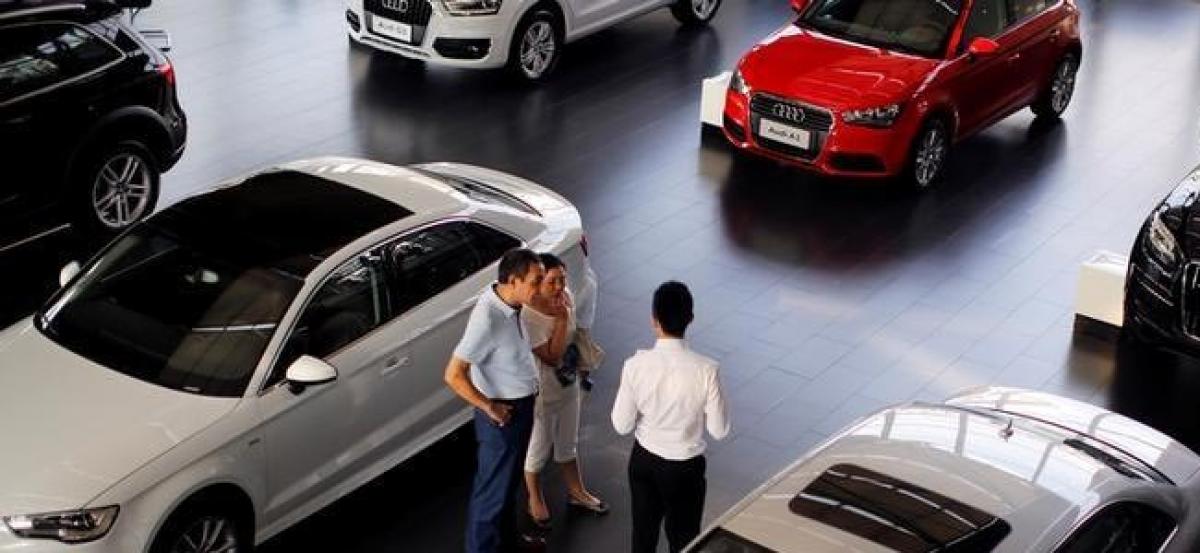Live
- ‘Get Set, Grow Summit 2024’ Focuses on Digital Detox for Families
- Stokes motivates his team to put in extra effort, says England pacer Potts
- From overcoming setbacks to leading India in U19 Women’s Asia Cup, Niki Prasad's amazing journey
- Driving Enterprise Security: Inside Venkata Reddy Thummala’s Leadership Journey
- Constitution debate: PM Modi hails 'Nari Shakti'; makes strong pitch for 'United Bharat’
- Abhijeet Bhardwaj: Revolutionizing Enterprise Analytics with Innovation and Expertise
- Bihar: Inquiry initiated against principal who went to buy veggies during school hours
- Press Sri Lankan Prez for release of Indian fishermen: TN Cong MP to EAM Jaishankar
- TN: DMK postpones executive meet due to heavy rains & Parliament session
- Porous silicon oxide electrodes can fix durability issues in batteries: Researchers
Just In

Chinese households, traditional savers with an aversion to debt, are rapidly warming to the idea of borrowing to buy a car, as automakers push financing deals to boost sales and margins in an increasingly competitive market.
Chinese households, traditional savers with an aversion to debt, are rapidly warming to the idea of borrowing to buy a car, as automakers push financing deals to boost sales and margins in an increasingly competitive market.
Nearly 30 percent of Chinese car buyers bought on credit last year, up from 18 percent in 2013, according to analysts from Sanford C. Bernstein and Deloitte, helping a rebound in the car market after a sticky 2015.
That is welcome news to China's government, which wants consumers to borrow and spend more to shift its slowing economy away from heavy industry and investment-led growth.
Beijing resident Wang Danian said he planned to buy his first car on credit, saying it was the smart move.
"I can use my cash to do other things," the 28-year-old said while looking at an FAW [SASACJ.UL] Besturn X80 sport utility vehicle. "If I use all my savings at once to buy a car, and then something happens, I can't manage the risk."
Six consumers interviewed by Reuters said they would all consider loans, lured by low-fee and interest-free deals, with half saying they'd prefer to buy on credit and save cash for other items.
"I'd estimate after the manufacturer came out with the low-interest deal that about 30 percent of potential cash buyers switched to buying on credit," said a salesman at a Volkswagen (VOWG_p.DE) dealership in eastern China's Jiangsu province who gave his name as Mr. Zhao.
That is still a far cry from the more than 80 percent of cars bought on loans in the United States, but Deloitte predicts China will reach 50 percent by 2020.
Global automakers have struggled to encourage this trend for some time; Volkswagen established its finance subsidiary in 2004, but was held back by strict regulations on underwriting loans and sources of funding.
As the government gradually relaxed those restrictions over the last seven or eight years, financed purchases have grown, with Daimler's (DAIGn.DE) Mercedes saying more than 30 percent of its cars in China are now bought on credit, and it reported 31 percent year-on-year growth in net lending as at the end of July.
China's auto market struggled last year thanks to the slowest economic growth in 25 years and a stock market rout, but rebounded in October when the government cut sales tax on smaller cars. By July, vehicle sales were rising at their fastest monthly rate in three and a half years.
"While the government's tax reduction was the most obvious explanation for the rebound in Chinese car sales at the end of 2015, soaring auto financing penetration represented another, lesser noticed, driver of the boom," Bernstein said in April.
DEFAULT RISKS
More Chinese automakers jumped into the loans market last year, with Guangzhou Automobile Group (601238.SS)(2238.HK) and Geely (0175.HK) setting up financing firms.
Several Chinese carmakers also reported a significant impact from financing activity on their accounts for the first half of 2016.
SAIC Motor Corp (600104.SS), China's largest automaker, said its net operating cash flow dropped by 16.6 billion yuan ($2.5 billion) from the same period a year ago, as money was diverted to its financing unit for consumer loans.
Dongfeng Motor Group (0489.HK) similarly reported a 3.6 billion yuan year-on-year fall in net cash flow due to an increase in loans and receivables of its financial business.
Great Wall Motor (601633.SS) recorded a 140 percent increase in interest income, mainly because of its finance subsidiary.
BYD (002594.SZ)(1211.HK), backed by Warren Buffett's Berkshire Hathaway (BRKa.N), said with 13.6 percent of its sales done on credit, financing was already making considerable contribution to its profits.
Controlling the risk of default on these loans can be difficult in China, where there isn't a reliable credit rating system for individuals comparable to the U.S., said Yale Zhang, managing director of consultancy Automotive Foresight in Shanghai.
"You cannot spend one month to investigate one person and then in the end you only land 100,000 yuan," Zhang said.
That got the sector into trouble when China previously tried to pump up car sales through loans after the Asian financial crisis of the late 1990s. A lack of risk control resulted in widespread defaults and a government clampdown for several years in the mid-2000s, he said.
"It arguably remains open to question whether Chinese auto (non-performing loans) will remain similarly low, should macro conditions deteriorate," Bernstein said in April, observing low delinquency rates thus far.
Chinese e-commerce giant Alibaba (BABA.N), which last year inked a collaboration deal with China Yongda Automobiles Services (3669.HK), says it can address this risk thanks to 'big data' it has on its customers, including their credit records.
The company's auto web portal offers "instant automobile financing", approving loans in as little as 20 seconds, a spokeswoman said.
($1 = 6.6790 Chinese yuan renminbi)

© 2024 Hyderabad Media House Limited/The Hans India. All rights reserved. Powered by hocalwire.com







